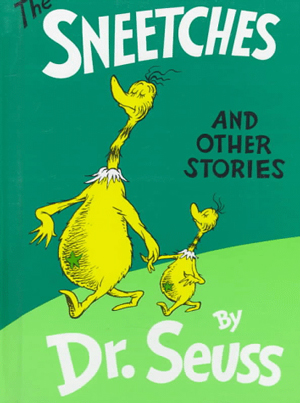
I don’t often blog about current events, but there have been so many things happening in the arena of gay rights, I felt like chiming in this week. This post also gives me a chance to explain my long-held, personal conviction that Dr. Seuss taught us everything we need to know about the politics of exclusion. More on that later.
It’s nearing prom season, and each year for the past 15 years or so, there have been news stories big and small on the fracas over lesbian and gay couples attending. It’s a positive sign that more teenagers are feeling comfortable coming out as gay. Unfortunately, for many of them, participating openly and normatively in high school traditions requires lawsuits, grassroots activism and a big whooping of community outrage.
The gay/prom debate has been the source of literary and cinematic inspiration, vis-a-vis Aaron Fricke’s personal memoir “Reflections of a Rock Lobster” and the Canadian flick “Prom Queen” with Kids in the Hall’s Scott Thompson.
This year, a prom story made national headlines, morning news shows and even Ellen. Constance McMillen, an 18-year-old senior at a public, rural Mississippi school, challenged a prom policy of heterosexual-only dates, and the school district responded by cancelling the prom for all students. The logic was thus: if no students get a prom, no one’s civil rights are violated. Seems more like an elementary school teacher’s policy to me, e.g. “You can’t chew gum in class unless you have enough for everyone.” The problem is, by high school, kids understand the concept of individuality. Not everyone wants a stick of your banana-mango gum, and that’s just fine. Constance knew the score, and she got help from the ACLU. The case went to a federal judge who ruled that Constance’s constitutional rights were violated but a trial will be underway later in the year. As a sidebar, cancelling everything for everybody has been a gay exclusion strategy on numerous occasions when students have tried to start Gay/Straight Alliance clubs; the school district bans all student clubs.
We also have in the news a Pentagon committee reviewing the Bill Clinton era military policy “Don’t Ask, Don’t Tell.” So far, they’ve determined that the policy has, at times, been unfairly implemented. This, after 17 years of enforcing a system of privilege for heterosexual military men and women and discharging over 13,000 gay troops. But it takes time, they say, to evaluate how gays can be better integrated while ensuring the rights of all (read: heterosexual) servicemen and women. Meanwhile, gays serve openly in the armed forces of just about every other industrialized country: the United Kingdom, France, Russia, Israel, to name a few.
This brings me to “The Sneeches” by Dr. Seuss.

“Now, the Star-Bellied Sneetches had bellies with stars.
The Plain-Belly Sneetches had none upon thars.
Those stars weren’t so big. They were really so small.
You might think such a thing wouldn’t matter at all.”
But the stars mattered quite a bit to the Sneetches, and when a fast-talking salesman with a star-making machine shows up, chaos ensues. Stars on bellies become déclassé with the help of the salesman’s star-removal machine; then, as the nouveau starred Sneetches go through the removal machine, stars become chic again, and over and over, the symbol of privilege changes, culminating in a frantic assembly line of Sneetches running from one machine to the other. They end up losing track completely of who had stars on their bellies in the first place. The lesson:
” The Sneetches got really quite smart on that day.
The day they decided that Sneetches are Sneetches.
And no kind of Sneetch is the best on the beaches.
That day, all the Sneetches forgot about stars and whether
They had one, or not, upon thars.”
I don’t know if Dr. Seuss had gay rights in mind when he wrote the story, but for me, it’s always captured the essence of the debate. Whether it’s homophobes talking about how opening marriage to same-sex couples will tarnish their sacred institution. Or “moderates” saying they would never deny gay people their rights, but Marriage is for heterosexuals and gay couples can be recognized just fine through “domestic partnerships” or “civil unions.” Or a school board that would rather forgo a high school prom than condone the participation of gay couples. Or military generals claiming it’s just not so simple as to allow gay people to serve openly in the armed forces—it’s an organization steeped in centuries of heterosexual tradition, after all.
Yes, the answers are often simple. Many of us learned them in a children’s picture book.


